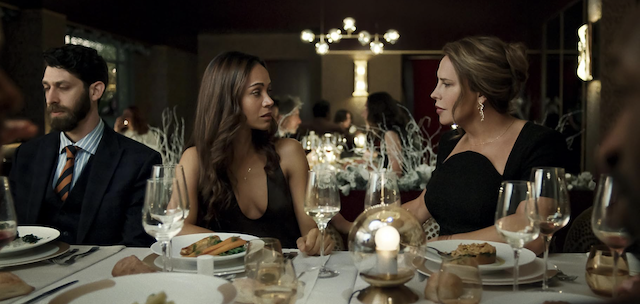
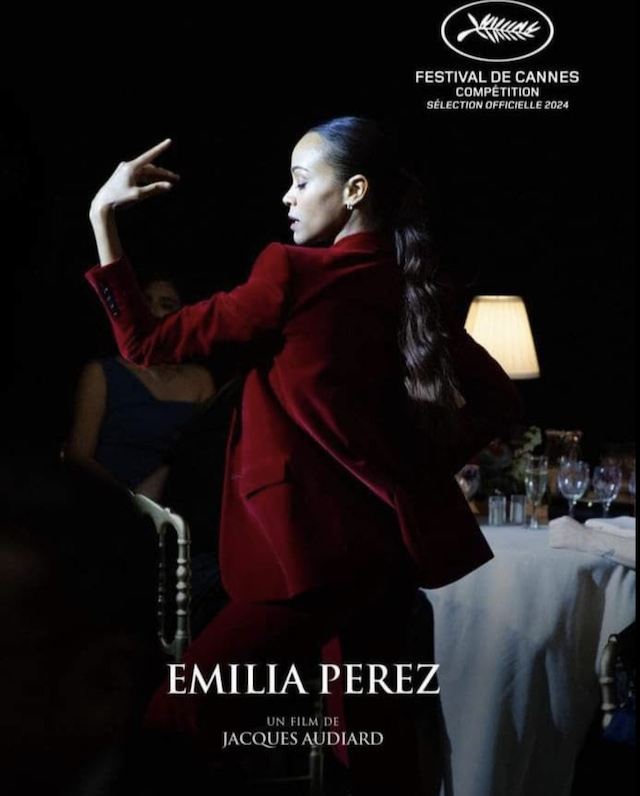
Press Conference With Actors Zoe Saldana, Selena Gomez, Karla Sofía Gascón and Director Jacques Audiard
Q: In your wildest dreams, the first time you worked on a Disney production, did you think your life and career would ultimately lead you to the role of Jessi and a stunning movie like Emilia Pérez?
Selena Gomez: I don’t think I ever thought that I would be here, but I’m genuinely so grateful because this is a role I’ve been waiting for a very long time. It was really incredible to be able to sink my teeth into something like Jessi’s character, so complex and layered. It honestly feels like it’s just the beginning of something new for me.
Q: There’s a line in the film that says: “To listen is to accept.” During the gunfight, as Jessi is listening to Emilia confess that she is Manitas by recalling memories, do you think Jesse learned in that moment to accept Manitas and love her as Emilia?
Selena Gomez: There is this moment when she didn’t have a chance to really understand, but I could feel the love was immediately there. That’s why the scene was so intense to shoot. By the way, that was the first scene that Jacques had me shooting. It was very, very crazy but I am so grateful for that. That sense of urgency was her wanting to know more: when you think someone’s gone and all of a sudden it’s this reincarnation of someone that was everything to you, she would have been blind to not know that it was pulling at her, but it was so quick at the same time. As I said, it was a very intense scene to shoot.
Q: How did a sci-fi geek like you end up starring in Emilia Pérez?
Zoe Saldana: I’m an artist at heart and Emilia Pérez gave me an opportunity to reconnect with parts of me that I said goodbye to. When you’re young you’re fearless and little you know that when your parents are keeping you busy putting you in dance or art or tennis, if you’re lucky enough to have families that can afford that, then most of the time you’re able to use these skills for something else in your life. That catapulted me into a career where there was an abundance and roles when it came to active women, action and science fiction. And I do have an affinity for that. But I am a native New Yorker, I have jazz hands in my DNA. And I’m a dancer at heart. I will forever be a dancer.
It was a blessing playing a character like Rita where she lives a lot on then inside, a woman that does not have the courage or the strength to speak up and be her own advocate. She can be an advocate for others but she can’t speak for herself. That was a very familiar woman in my eyes, a woman that was desperate for change and visibility at all costs. I just wanted to know what it was like to be like her. In the movie there are those breaks of song and dance where you’re able to see how they truly feel and what they truly think. That jump from reality was what made this movie very special to me. I was able to add so many parts of myself.
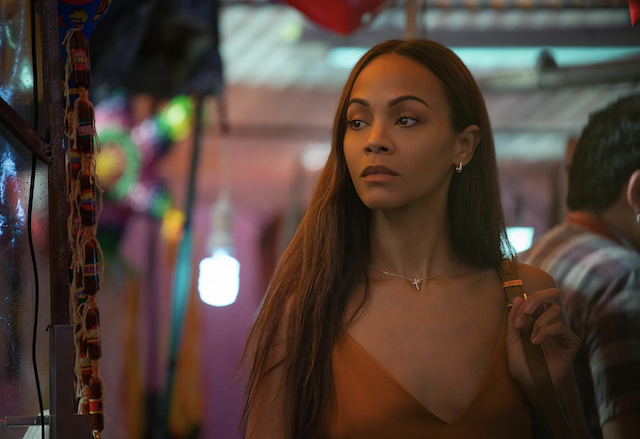
@Courtesy of Netflix
Q: Emilia goes through a transformation in this film. Some audiences have been surprised when they learn that you also play Emilia before her transformation. Can you talk about working with the hair and makeup team in developing that character, and how much time did you spend in hair and makeup before shooting?
Karla Sofía Gascón: At the end of the day, all the applause and all the accolades, it’s not just for the hair, the color of our hair, of our skin, or our sexuality: it is done for the work that we do. What we want to bring about is that we’re all worth it. That’s the message that we’re trying to give with this movie. Constructing a character like this, it definitely took a lot of work on my part, but this would not be possible without the support with all this wonderful team behind the scenes, and of course all these wonderful actresses here. It takes teamwork making this happen.
And of course it takes the lead of our director. At the end of the day, it is the work of a team of hundreds of people. If you see the credits, you see hundreds of names making it happen. This wonderful construction process to build this character, it was really building both Minitas and Emilia. What we needed to discover is which Manitas and which Emilia we wanted to bring to the audience. It took a lot of discussions: the first and the most important for me wasc with Jacques: what was the reason for Emilia wanting this transformation?
Was it because she wanted to run away from justice or was it because it was her truth? Because that could really change the meaning of the movie. When we started the work with physicality I had to learn so much from everybody. They really tried to teach me about music and dance because I didn’t know anything, I am a bit rough around the edges about that type of stuff. You know I dance like Robocop. But all of that helped to build the character, to build the world of Emilia and Manitas, this terrifying character. At the bottom, the movie it’s about somebody who’s trying to be themselves and get out of that world of darkness.
Q: Jacques, this film is dripping in beautiful, complicated contradictions. Was that in the writing process? Was it brought to you by the actresses? Did it come alive when they showed up or was it on the pages that you wrote?
Jacques Audiard: The way I can talk to you about this film today is not the same way that I would have talked about it four years ago when I started writing. Things have continued to appear to me throughout and continue to surprise me about Emilia Pérez. I wanted a film that was not complex but full of contradictory things. For instance, all the female characters in the film change in a very meaningful way. They all go from point A to point Z, every single one of them. It’s an old story that I often go back to and try to tell. It’s the story of the double life. How many lives does one have a right to live?
And how much does it cost you to have another life? For instance, initially in the first screenplay, the ages of the characters were very different. But then I met Karla Sofia and Zoe quite quickly one after the other. I don’t really remember in what order, but Karla Sofia was in Mexico City, Zoe was by Zoom, and it was them who told me about the mistake that I’d made about the ages of these characters. Because if you’re a woman of 25, you haven’t had any life, you haven’t had any real drama or tragedy, you’re still becoming.
Whereas if you’re 40 and you’re in some deep dark corner of a Mexican lawyer’s office and you’re black, basically changing your life is going to cost you a great deal. So it was Zoe and Karla Sofia who really told me what I needed to do in terms of the age of these characters. The only one who doesn’t change across the film in terms of age is Jessi, played by Selena. She’s Snow White, this eternal idea of youth.
Q: The film uses choreographed musical numbers to convey big themes of self-identity, remorse, atonement, and grief. How much time did you guys have in rehearsal?
Selena Gomez: I was one of the last to be cast, so I probably had a little less rehearsal time, but it was really, really fun. Even if that was a big surprise, I appreciated that Jacques didn’t want to use necessarily any auto-tune. He wanted to record us every time we did the number and ultimately he used a lot of those vocals in the movie. It was really raw and I appreciated that it didn’t sound perfect. The songs were beautifully written, it was a learning experience for me. It was a lot of head banging, but it was really worth it, it was beautiful, but honestly the dancing Queen is Zoe!
Zoe Saldana: My rehearsals were extensive. I was finishing up a show in North Africa, I wrapped on the 2nd of March, I flew on the 3rd and on the 4th we were already in the recording studio. From March on until we began shooting, I would say until late April, it was constant rehearsal: five, six days a week, I was really nervous. It had been over 20 years since I walked into a dance. I had to adapt my brain to understand and to feed information to my muscles. It’s a very technical thing, my goal was to arrive the day of shooting because during our rehearsals I realized that Jacques was expecting preparation but he was also expecting experiment.
We had to be very present in order for us to find things that were going to surprise us. That’s the most exciting place to be as an artist, being allowed to collaborate with your director, you still want to come totally prepared. I had like an average of like five to seven weeks of rehearsal. And even while we were shooting, I was constantly learning the choreographies for the following scene. Jacques would show up by surprise at our rehearsals of the choreography and he would look at something and he would be like: “No it’s too much, let’s change it, let’s have it down, let’s add more”. So it was always an element of surprise and absolute presence combined with preparation. It was a wonderful experience but definitely not a walk in the park for sure, which is probably why I felt it was so special.
Jacques Audiard: There is a scene when Emilia was not dancing. She was talking to Rita saying: “A tough guy only dances twice in his life: the day of his wedding and the day of his daughter’s wedding”. Kind of like The Godfather. That reminds me of the title of one of Norman Mailer’s novels, Tough Guys Don’t Dance.
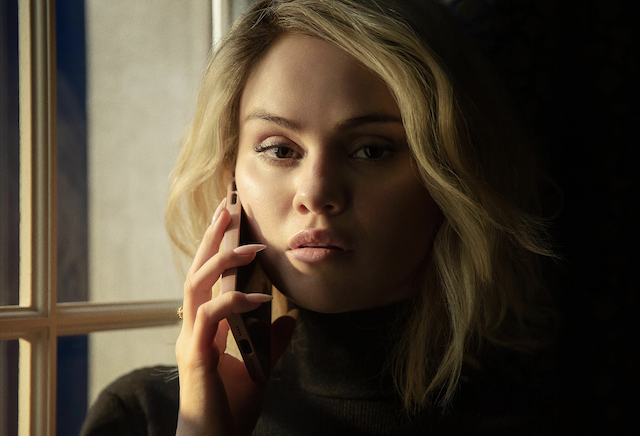
@Courtesy of Netflix
Q: There’s something very empowering and powerful about what you as women have accomplished as a cast. How does that resonate with you? And how has it changed you?
Zoe Saldana: I believed that my opportunities came as being the only female in a room. When you’re young and you’re fearless and you’re a bit reckless, you feel you have something more over other women. That way you’re feeding a system unconsciously that has been designed to keep women separate because throughout time, it has been clearly understood that when women bond together, we are unstoppable. There’s nothing we can’t cure. There’s no mountain we can’t lift. If it means we have to save someone we love, we are nurturers, we are selfless by nature.
And when we come together, we are very celebratory. One thing that’s very important, I come from a family of women. I’m one of three sisters. I was raised by women and grandmothers. So that is the environment where I feel at my most comfortable. Everything else makes me really vulnerable and exposes me to danger because I’m not around my guidance. I’m not around my cure, my safety net. This environment connected me with the fact that we do have to invest in stories about women, for women.
And I commend the men like Jacques Audiard that understand the value of that and don’t perceive it as devaluing his work, his art, by telling the story of a woman, of three women in this case. We are ready as a human race to embrace that more and more, not as a favor, but just by making space and allowing that to be out there in our cinema, in our industry.
If you like the interview, share your thoughts below!
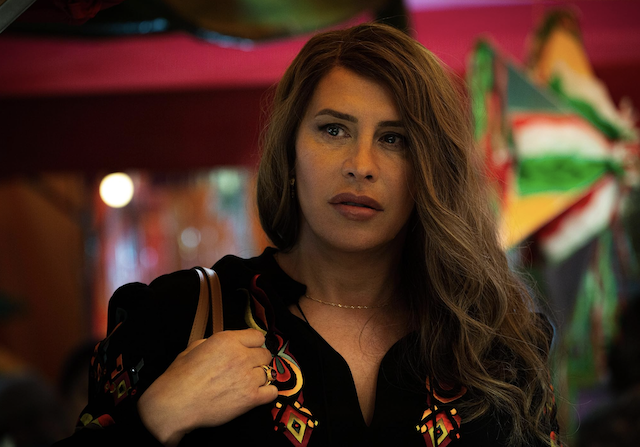
@Courtesy of Netflix
Check out more Adriano’s articles.
Here’s the trailer of Emilia Pêrez:

